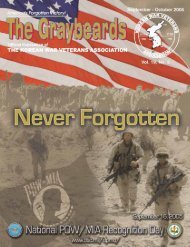The Graybeards - Korean War Veterans Association
The Graybeards - Korean War Veterans Association
The Graybeards - Korean War Veterans Association
Create successful ePaper yourself
Turn your PDF publications into a flip-book with our unique Google optimized e-Paper software.
Sister Remembers Brother Killed in <strong>Korean</strong> <strong>War</strong><br />
Above, Gernilee Carter walks along the long,<br />
black polished black granite wall that features<br />
25,000 images of support troops during the<br />
<strong>Korean</strong> <strong>War</strong>. Photo by Rudi Williams.<br />
At right, Gernilee poses by a photo of her late<br />
brother, Army Pfc. Donovan “Don” Carter. She<br />
affixed the photo to the shiny, black granite<br />
wall of the <strong>Korean</strong> <strong>War</strong> <strong>Veterans</strong> Memorial.<br />
Photo by Rudi Williams.<br />
By Rudi Williams<br />
American Forces Press Service<br />
WASHINGTON, Aug. 14, 2003 -<br />
Gernilee Carter, 58, was only 5 years old<br />
when her brother, Donovan “Don” Carter,<br />
then 18, became one of the first casualties<br />
of the <strong>Korean</strong> <strong>War</strong> when he was killed on<br />
July 12, 1950.<br />
Some 50 years later, July 27, 2003, she<br />
made her first journey to the <strong>Korean</strong> <strong>War</strong><br />
<strong>Veterans</strong> Memorial on the National Mall<br />
for DoD’s anniversary of the signing of the<br />
armistice ended fighting.<br />
Carter attached a black and white photo<br />
of her brother to the memorial’s shiny,<br />
black granite wall. She said there hasn’t<br />
been a day in more than 53 years that she<br />
hasn’t thought about the death of her<br />
beloved brother.<br />
His “little sister,” and the youngest of<br />
five siblings, Carter said she and Don were<br />
close. She remembers him as “big, handsome,<br />
cuddly, loving and happy.”<br />
“He adored me. He was my first love,”<br />
Carter said.<br />
“He ‘lied about his age,’ as the saying<br />
goes, to join the Army in 1948,” Carter said<br />
she found out after she got older. “His date<br />
of birth was Feb. 28, 1932. He wrote upon<br />
enlistment that he was born in 1930.”<br />
On July 5, 1950, Task Force Smith, the<br />
1st Bn., 21st Inf. Regt., 24th Inf. Div., was<br />
the first U.S. unit to engage the North<br />
<strong>Korean</strong>s, she noted. And her brother’s unit<br />
– Co. M, 3rd Battalion, 21st Regt., 24th Inf.<br />
Div. — followed “immediately,” she<br />
added.<br />
According to the information on the<br />
Web site for DoD’s commemoration of the<br />
50th anniversary of the war, most of the<br />
men were 20 years old or less; only onesixth<br />
had seen combat. <strong>The</strong> Americans<br />
were vulnerable to enemy flanking attacks,<br />
lacked the means to stop enemy tanks and<br />
were without reserves. Carter’s extensive<br />
research indicated that her brother’s company<br />
was “totally surrounded by the North<br />
<strong>Korean</strong>s armed with Russian-built T-34<br />
tanks. <strong>The</strong> result was not wonderful and<br />
I’ve never forgotten him for a day.”<br />
“I have an individual personnel file that<br />
tells exactly where his remains were, where<br />
they took them temporarily and what they<br />
were wrapped in,” Carter said. “I know<br />
everything, even every wound he had.”<br />
<strong>The</strong> remains of Army Pfc. Donovan<br />
“Don” Carter were brought home to his<br />
family about three years after his death<br />
on the <strong>Korean</strong> battlefield. <strong>The</strong>y were<br />
buried in a cemetery across the street<br />
from where the family lived in<br />
Northumberland, Pa.<br />
“Mother couldn’t handle that, so we<br />
had to sell the house and move away,”<br />
Carter noted. <strong>The</strong> family moved across<br />
the Susquehanna River, “for my mother’s<br />
peace of mind.”<br />
She said no one else from her family<br />
came to DoD’s recent 50th anniversary<br />
recognition or to visit the <strong>Korean</strong><br />
<strong>War</strong> <strong>Veterans</strong> Memorial, “because they<br />
found this all too painful.”<br />
Carter didn’t attend the dedication<br />
of the memorial in 1995, but said she’s<br />
active on the Internet with the <strong>Korean</strong><br />
<strong>War</strong> chat line. On Aug. 1, she attended<br />
a “Tiger Survivors” dinner in<br />
Northumberland. <strong>The</strong>y are a group of men<br />
who survived harsh treatment by the North<br />
<strong>Korean</strong> major who American prisoners of<br />
war called “<strong>The</strong> Tiger.”<br />
She e-mailed a message that day saying<br />
she was “quite excited and nervous” about<br />
talking with her brother’s Company M<br />
comrades who “were with him in battle<br />
when he died.”<br />
Carter said she also stays in touch with<br />
others who were in the battle with her<br />
brother. One, Jack Higdon, whom she said<br />
miraculously survived, went on to earn the<br />
Silver Star Medal for valor in Vietnam.<br />
“He says Vietnam was a piece of cake<br />
compared to Korea,” Carter said.<br />
“Death affected the family profoundly<br />
Continued on page 69<br />
Page 64<br />
<strong>The</strong> <strong>Graybeards</strong>
















